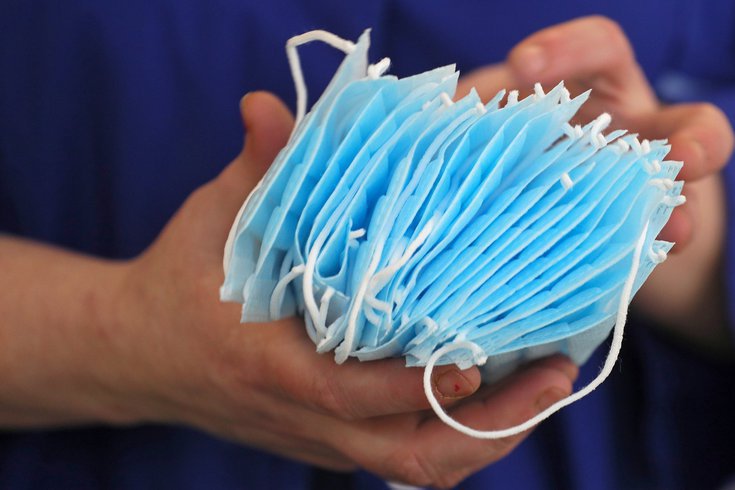
March 02, 2022
 VLADIMIR SMIRNOV/TASS/SIPA USA
VLADIMIR SMIRNOV/TASS/SIPA USA
Philadelphia has moved into the 'All Clear' phase of its COVID-19 response levels, enabling the health department to lift the mandatory mask mandate in indoor settings.
Philadelphia has lifted its COVID-19 mask mandate for most indoor settings, citing improvements in key public health metrics that determine whether restrictions are necessary.
The health department has moved the city into its "all clear" COVID response level amid falling case numbers, reduced hospitalizations, high levels of vaccination and a low rate of positive tests.
"I now declare Philadelphia is moving into the 'all clear' level effective immediately," Health Commissioner Dr. Cheryl Bettigole said Wednesday morning. "This means that we will no longer be enforcing the indoor mask mandate in most settings.
The city's "all clear" response level still includes precautions for certain high-risk settings, where the mask mandate will be lifted in phases over the coming week.
In all Philadelphia schools, the mandatory mask requirement will remain in place until March 9. To avoid a surge of cases following the district's spring break, which runs from April 11-15, a one-week mask requirement will be enforced beginning April 18.
Masks will also continue to be required in health care settings, congregate living settings and on public transit.
City buildings will require masks until Monday when they will become optional for visitors and fully vaccinated staff. Unvaccinated staff will still be required to wear two masks while indoors and around others.
Businesses and other institutions are allowed to be more strict than the city's COVID response levels. Some businesses may continue to require proof of vaccination or that everyone wears a mask.
Sports venues such as the Wells Fargo Center will no longer have a mandate in place for masks.
— Wells Fargo Center (@WellsFargoCtr) March 2, 2022
The mask mandate on SEPTA is determined by the federal government and will remain in effect until further notice.
The city also reminds residents that many people may continue to wear masks for greater safety.
Bettigole said Wednesday that masks remain an important tool to lower the risk of an infection. She advised people to consider wearing a mask depending on the risk level of the situation.
"Each of us now (is) responsible for our own risk and the risk we take for the people we love, so think about your risk budget, if you want to think of that way," Bettigole said. "When is it really worth it to you to take off your mask and take some additional risk? There's still COVID out there, right?"
The health department noted in a news release that Wednesday's change should not be construed to mean the pandemic is over. If a new COVID variant were to come to Philadelphia or cases start to rise again, the city may return to mask precautions or a higher level of its tiered response system that includes other restrictions.
Philadelphia is averaging about 87 new COVID-19 cases per day, about 2% of the rate seen during the peak of the omicron variant, but still about three times higher than the lowest rate seen last summer.
In Philadelphia's hospitals, there are 156 patients who have tested positive for COVID. That figure is one-tenth of the high mark during the omicron surge, but nearly three times higher than the lowest point last summer.
The city's progress with vaccinations, which greatly reduce the risk of a severe infection, influenced the decision to drop the mask mandate, officials said.
About 75% of Philadelphia residents ages 12 and older are fully vaccinated. Nearly 400,000 residents have received a booster shot, including about one-third of adults.
Among children ages 5-11, 53.6% have received at least one vaccine dose, though new data suggests Pfizer's vaccine offered little protection against infection during the omicron surge.
Last week, new CDC guidelines eased mask guidelines for most Americans, opening up questions about Philadelphia's plans as other jurisdictions in the state and country dropped their requirements.
The CDC's rubric for masking is based on case rates, hospital admission rates and hospital capacity. Philadelphia's stricter response looks at cases, hospitalizations, the percent of tests that come back positive, and case trends to account for sudden spikes in transmission.
"Philadelphia is unique in that we are the poorest big city in the country, making us more vulnerable to COVID-19 than many places in the country," Bettigole said. "But we do have strong local data capacity enabling us to look at data in ways that may be out of reach of many U.S. counties."
If the city had followed the CDC guidelines last fall, residents would have been unmasked during the delta wave, Bettigole said. There could have been many more infections and hospitalizations before the omicron surge occurred.
One of the key factors that encouraged the city to lift the mask mandate Wednesday was a recognition that the test positivity rate is increasingly skewed by the prevalence of at-home rapid tests. These numbers are not often reported to the health department, which still relies heavily on PCR tests to determine the percentage of positive COVID tests.
Based on the inclusion of the limited data available for rapid tests, Philadelphia's test positivity rate fell below the threshold of 2% to around 1.7%, clearing the hurdle for the city to move to the All Clear response level.
Wednesday's announcement marks the health department's final regularly scheduled COVID briefing. Future briefings will be scheduled if new developments increase the risk to the public. Bettigole cautioned that things can change quickly and that the city remains prepared to upgrade its response level if need be.
"It depends on what this pandemic throws at us," Bettigole said. "I'm hoping that we have enough immunity in the city now that we really are at an end point, but confident in the people of our city to do what they need to do if something bad comes out."